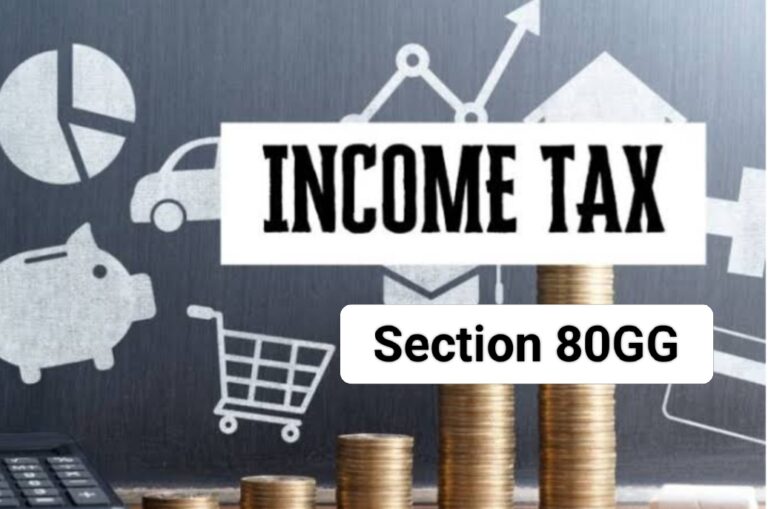If you are living in rented accommodation but do not receive House Rent Allowance (HRA) from your employer, you can still claim a tax deduction under Section 80GG of the Income Tax Act, 1961. This provision provides relief to taxpayers who pay rent for their residence but do not benefit from the HRA exemption.
Here’s a detailed guide on Section 80GG deduction, including eligibility, conditions, deduction limit, and the process to claim the benefit.
What is Section 80GG of the Income Tax Act?
Section 80GG allows individuals to claim a deduction for rent paid towards any furnished or unfurnished accommodation occupied for residential purposes, provided they do not receive HRA from their employer. This deduction is available under the old tax regime, not under the new tax regime.
Who Can Claim Deduction Under Section 80GG?
The following individuals are eligible to claim a deduction under this section:
✅ Salaried individuals who do not receive HRA from their employer.
✅ Self-employed individuals or professionals who pay rent for their residence.
✅ Business owners who reside in rented accommodation.
✅ Individuals living in a property owned by parents, provided they have a valid rental agreement and pay rent to their parents. (Note: The rental income received by parents is taxable in their hands.)
Eligibility Conditions for Claiming 80GG Deduction
To claim deduction under Section 80GG, the following conditions must be satisfied:
✔️ The taxpayer must have opted for the old tax regime and should not be governed by Section 115BAC(1A) (new regime).
✔️ The taxpayer has not received HRA at any time during the financial year.
✔️ The taxpayer, spouse, minor child, or HUF of which the taxpayer is a member, should not own any residential property at the place where they currently reside or work.
✔️ If the taxpayer owns residential property elsewhere, it should not be treated as self-occupied property.
✔️ The taxpayer must file Form 10BA, declaring the details of rent paid and confirming no ownership of residential property at the place of residence.
✔️ If annual rent exceeds ₹1,00,000, the PAN of the landlord must be submitted.
✔️ If the taxpayer has changed jobs during the year and received HRA from any employer, they cannot claim this deduction for that financial year.
Section 80GG Deduction Limit
The deduction under Section 80GG is allowed as the least of the following amounts:
- ₹5,000 per month (i.e., ₹60,000 annually)
- 25% of total income (excluding long-term capital gains, short-term capital gains under section 111A, and deductions under sections 80C to 80U)
- Actual rent paid minus 10% of total income
The lowest of these three amounts will be considered as the deduction amount under Section 80GG.
How to File Form 10BA?
Form 10BA is a declaration that must be filed by individuals claiming rent deduction under Section 80GG. It serves as proof that the taxpayer does not own any residential property at the place of residence and fulfills other eligibility conditions.
Details to be filled in Form 10BA:
- Full Name and PAN of the taxpayer
- Complete address of the taxpayer
- Duration of tenancy and rent amount paid
- Mode of rent payment
- Name and address of the landlord
- PAN of the landlord (mandatory if annual rent exceeds ₹1 lakh)
- Declaration confirming no ownership of residential property by the taxpayer, spouse, minor child, or HUF at the place of residence or employment
Where to Get Form 10BA?
Form 10BA can be easily accessed through:
✔️ The official Income Tax Department e-filing portal (www.incometax.gov.in)
✔️ Organization’s HR or accounts department (for salaried individuals)
✔️ Assistance from a tax consultant or CA
The form must be filed online before claiming the deduction while filing your Income Tax Return (ITR).
How to Claim Deduction Under Section 80GG?
Eligible taxpayers can claim the deduction under Section 80GG by following these steps:
- Ensure that you have opted for the old tax regime.
- Verify that you have not received any HRA from your employer during the financial year.
- File Form 10BA online, providing all necessary details.
- Keep rent receipts, rental agreement, and landlord’s PAN (if applicable) as supporting documents.
- While filing your ITR, mention the deduction amount under Section 80GG in the relevant section.
Important: If you own a property in the same city where you work, even if you live in rented accommodation, you cannot claim this deduction.
Final Words
Section 80GG provides significant tax relief to those who live in rented properties without receiving HRA. However, strict eligibility conditions apply, and necessary documentation like Form 10BA is mandatory to claim the benefit. Ensure compliance to avoid rejection of the claim during tax scrutiny.
If you meet the conditions and reside in rented accommodation, do not forget to utilize this deduction while filing your income tax return under the old tax regime.
Frequently Asked Questions (FAQs)
Q1. Can I claim 80GG if I receive HRA from my employer?
Ans: No, you cannot claim a deduction under Section 80GG if HRA forms part of your salary.
Q2. Is 80GG deduction available under the new tax regime?
Ans: No, this deduction is only available under the old tax regime.
Q3. Can self-employed individuals claim this deduction?
Ans: Yes, self-employed individuals and professionals can claim this deduction if they meet the conditions.
Q4. Do I need to submit proof for claiming 80GG?
Ans: Yes, you need to file Form 10BA and maintain rent receipts, rental agreements, and landlord’s PAN details (if applicable) as proof.
